The Stratus advantage for facility management
Modern campuses, from sprawling IT parks and industrial plants to airports and research centers, are where India’s innovation, productivity, and dreams come alive. They are small cities within cities, pulsing with energy, collaboration, logistics, and life.
But the cleanliness of these spaces is about more than looks. It’s about employee health, operational efficiency, environmental responsibility, and brand reputation. Pillars directly affecting India’s global standing.
Facility management companies play a critical role in this transformation. By taking ownership of day-to-day campus upkeep, regulatory compliance, and sustainability targets, FM partners allow organizations to focus on their core purpose, which is innovation, production, and service delivery, without draining valuable resources and leadership bandwidth on operational maintenance.
Facility management is no longer about “housekeeping.” It’s about operational resilience, audit-readiness, and future-proofing organizations in a world that demands visibility and accountability. In high-performance environments, even a missed cleaning metric can impact employee satisfaction, client perception, or operational safety. That’s why facility management isn’t just important; it is indispensable.
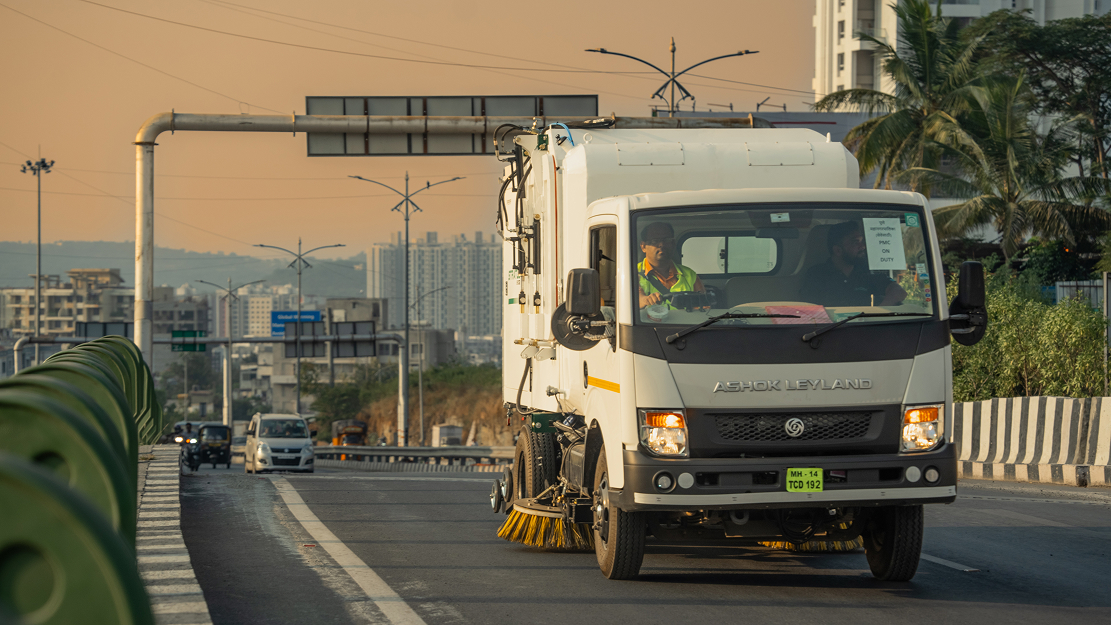
Major challenges in maintaining a clean facility.
1. Diverse roads and unpredictable debris
Facility-managed campuses are not just made of large roads; they are a complex network of internal streets, service lanes, parking lots, long walkways, and broad open plazas. These varied road conditions undergo constant change with the seasons, various activities, foot traffic, and weather events.
Outdoor roads and drivable areas in facility-managed campuses must handle a wide range of debris under constantly changing conditions. Facility management teams have to manage routine debris along with sudden surges like thunderstorms dumping wet leaves, a construction project spilling dust and rubble, a festival event scattering wrappers and plastic across parking lots, along with everyday fine dust, gravel, and dry waste.
2. Tight cleaning windows
Cleaning cannot happen at any time of day in a facility. There are strict operational windows, usually before office hours, shift changes, public events, or VIP visits.
This compressed schedule means sweeping equipment must be fast, maneuverable, and reliable, because missed cleaning deadlines are not tolerated in high-visibility corporate environments.
3. Labor volatility and scarcity
Facility management depends heavily on housekeeping and cleaning staff, but turnover is high, absenteeism is frequent, and retaining skilled sweeper operators is increasingly complex.
Manual sweeping crews are unreliable and inconsistent, while training new workers from scratch slows down service delivery. Mechanization is no longer optional to maintain quality at scale
4. Compliance demands and stakeholder expectations
Today, ESG audits, ISO certifications, EHS inspections, and investor sustainability reporting demand verifiable proof that facilities are maintained to the highest environmental and safety standards. Missed sweeping zones, airborne dust, or clogged drains don’t just cause internal escalations — they can lead to external penalties, failed certifications, and damage to ESG scores.
At the same time, employees, tenants, clients, and regulators expect campuses to be pristine, safe, sustainable, and audit-ready at all times. Facility management teams must consistently deliver near-perfect cleanliness and compliance, often under tight resource constraints, while also providing documented evidence of their operations for every stakeholder.
Tackling the complexities of modern facility management requires more than just traditional cleaning methods. It demands high-efficiency, low-maintenance sweeping solutions that can handle diverse surfaces and varying debris types in a single pass, operating quickly and quietly to fit within narrow cleaning windows without disrupting daily activities. With rising labor volatility, sweeping systems must also reduce manpower dependency through operator-friendly automation. Choosing the right sweeping solution is no longer just about keeping a campus clean. It’s about protecting organizational reputation, meeting sustainability mandates, ensuring compliance, and enabling operational excellence in an increasingly demanding world.
How Stratus street sweeper helps facility management companies cross these hurdles
1. Adapts to diverse surfaces and changing debris
Maneuverability for complex facility layouts
Stratus sweepers are built for easy mobility, with a tight turning radius and forward-reverse sweeping capabilities. Stratus easily navigates narrow lanes, sharp corners, and tight dead ends without complicated maneuvers. The high-visibility cabin, equipped with large mirrors and camera support, ensures operators have a clear, unobstructed view, enabling safer and more accurate cleaning.
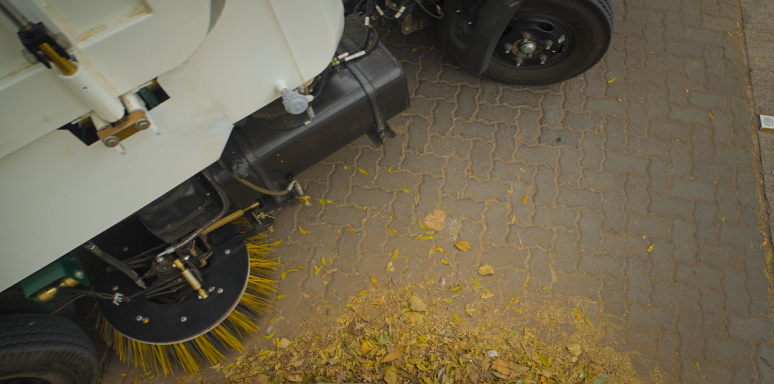
Full-spectrum cleaning across all debris types
With it powerful Air Blaster technology, Stratus efficiently handles fine dust, wet leaves, plastic litter, and varied debris in a single pass, reducing the need for multiple machines or repeated rounds. With its powerful on-board vacuum litter picker, Stratus easily removes piles of garbage and large debris such as plastic sheets, cloth pieces, coconut shells, and more, cleaning areas that traditional sweepers often miss.
The high-pressure washer tackles stubborn grime, oil spills, and stains on roads and plazas, while the storm drain cleaner clears clogged gullies and catch basins to prevent waterlogging after heavy rains.
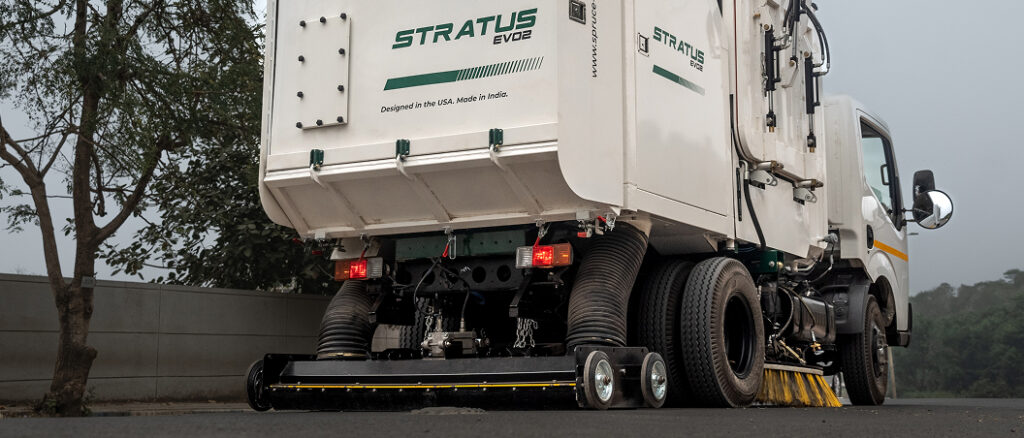
2. Cleans quickly and quietly to fit tight schedules
High-speed sweeping for rapid area coverage
Stratus is engineered for high-speed sweeping at up to 10 km/h, combined with quick mid-dump capability, allowing large areas to be cleaned and emptied rapidly and without disruption, fitting easily into narrow cleaning windows on campus.
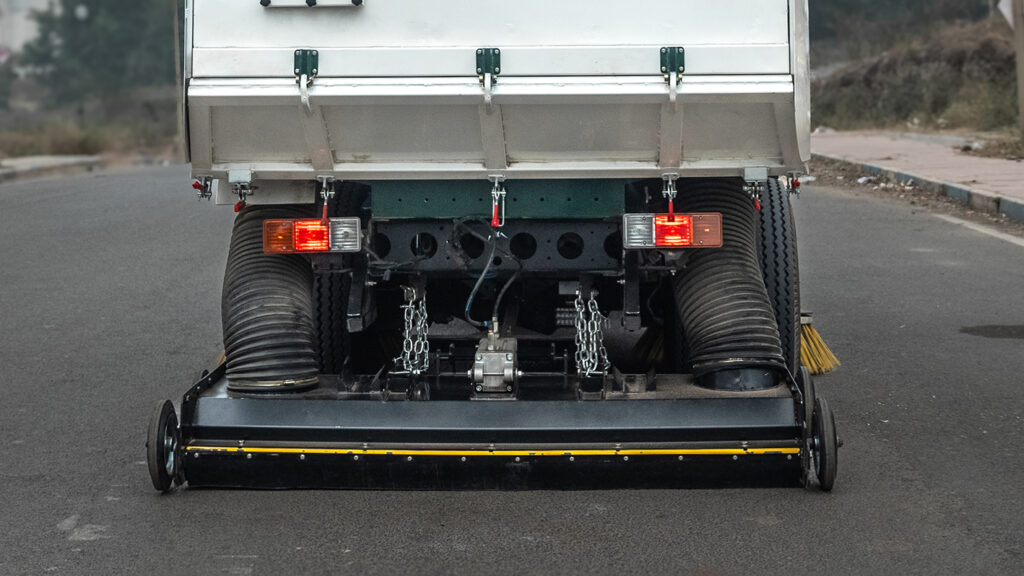
Low-noise operation for disturbance-free cleaning
Its low-noise operation, powered by rear-mounted engines, centrifugal separators, and international-grade silencers, ensures quiet sweeping even near offices, hospitals, airports, and residential zones, without disturbing occupants, patients, or visitors.
3. Reduces manpower dependency with easy, automated operation
Operator-friendly automation reduces reliance on manual crews
Stratus helps facility managers break the labor bottleneck by offering easy-to-use, automated sweeping. With simple joystick controls, one-button start/stop, and a high-visibility cabin, even a single trained operator can manage cleaning tasks previously handled by multiple manual workers.
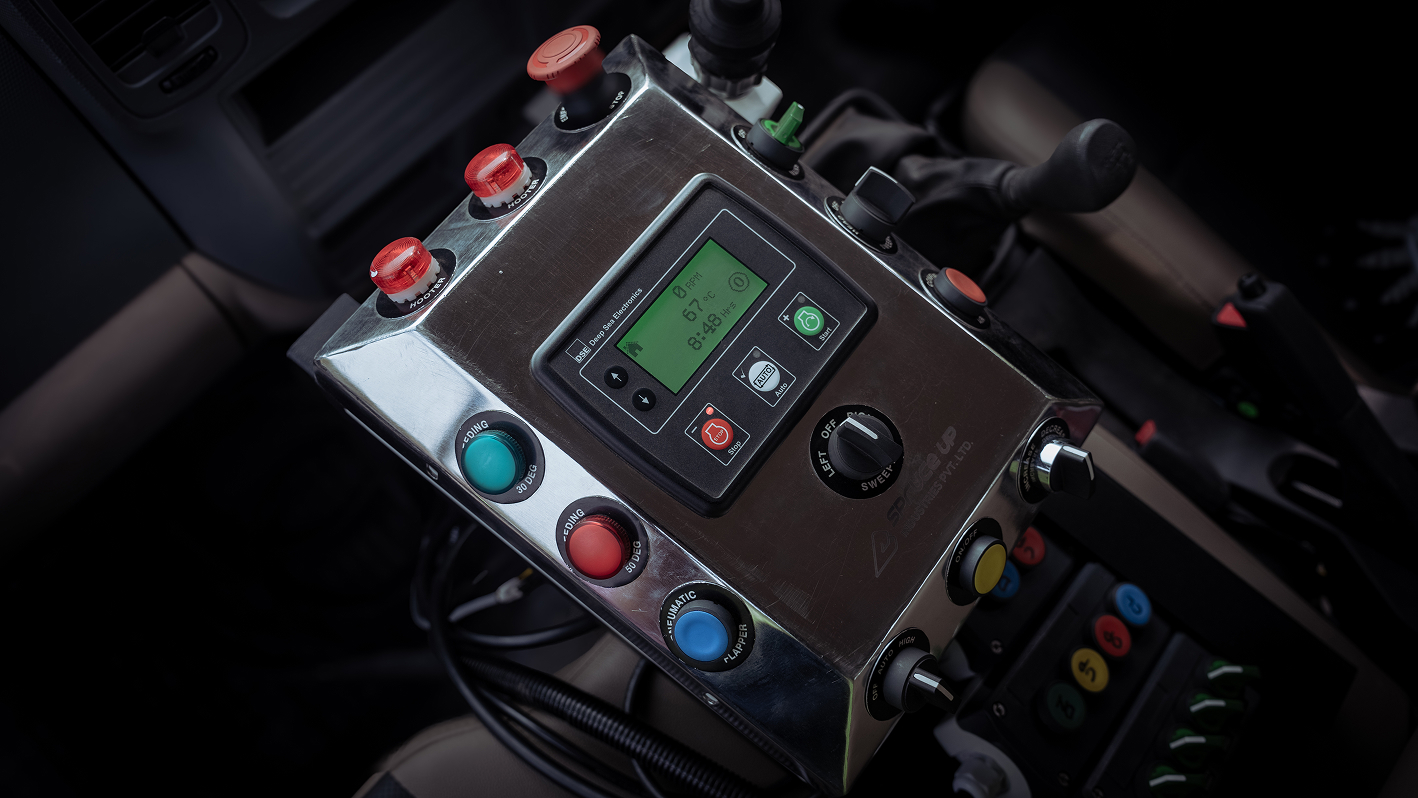
Consistent results and easier staffing
Automation with Stratus ensures greater cleaning consistency, reduces the impact of absenteeism and turnover, and simplifies staffing across multiple facilities. This ensures operations stay smooth even with fluctuating manpower.
4. Ensures long-term cost efficiency and predictable uptime
Durable engineering for lower maintenance and downtime
Stratus is built for long operational life, using globally trusted components like Mitsubishi engines, Parker hydraulics, and Eaton systems. Features like ground-level service access, curated spare kits, pan-India service support, AMC plans, and remote diagnostics via Spruce Up Genie ensure minimal downtime and predictable maintenance costs.
Reduced operating costs year after year
Fewer repairs, lower fuel usage, and longer service intervals translate into real operating savings, helping facility management companies stay financially sustainable while delivering high service standards.
Clean more, manage better, and spend smarter
Invest in sweepers that do more than just sweep.The The
The Stratus road sweeper combines sweeping, litter picking, pressure washing, and storm drain cleaning into a single compact machine, eliminating the need for multiple specialized units and extra manpower.
Its easy operation, fast maintenance access, and robust global components enable faster cleaning cycles, reduced downtime, and long-term reliability, driving lower recurring costs and higher operational efficiency for facility management teams.
Stratus isn’t just another sweeper, it’s a full-spectrum cleaning platform designed around the real challenges that today’s facility-managed campuses face. From handling diverse debris types to navigating tight cleaning schedules, Stratus empowers facility management companies to protect organizational reputation, meet compliance standards, and optimize resource use. Whether it’s maintaining pristine campuses, reducing labor dependency, or ensuring operational readiness, Stratus delivers consistent performance, reliable support, and smarter operations, every day, across every
campus.
